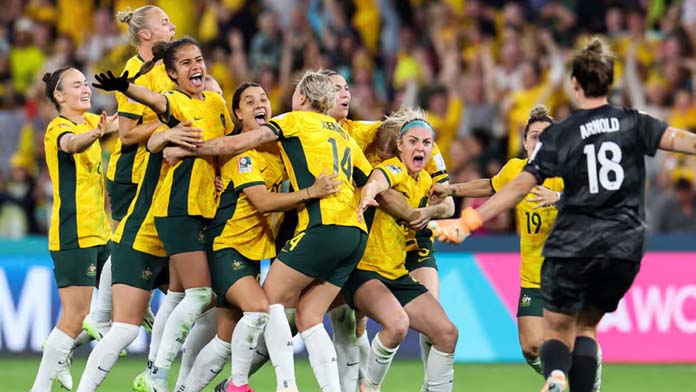The Matildas football team have become a phenomenon.
On the field, the team achieved what no Australian soccer team—men or women—have before, securing a spot in the FIFA World Cup semi-final after beating the team “most likely”, France, during a record-breaking penalty shoot-out.
The viewing figures eclipsed all but one sports television broadcast of the past two decades—including AFL and NRL grand finals.
Seven West Media said a total of 11.15 million viewers watched at one point during the broadcast, not including out-of-home viewing at venues such as pubs or live sites. Only Cathy Freeman’s 400-metre final at the Sydney Olympics in 2000 attracted more viewers.
The widespread admiration for a women’s team has been a blow against sexism, showing that women’s sport is finally winning the respect it deserves.
The Guardian interviewed an ex-player who appreciated “the way the nation now respects and is inspired by the Matildas”, recalling the “male domination of the game when we were trying to forge our own path, earn our own respect” in the past.
The significance of this in a country like Australia is huge. As one fan told the media: “I’m 52. And when I was a young girl, I would never, in my dreams, have had the thought that a woman, a girl, would play soccer [professionally].”
In the 1980s Matildas players had to produce and hand out flyers to attract people to their games, or phone television stations and beg them to broadcast matches. When the team travelled to the 2003 World Cup not a single journalist turned up to the airport press conference.
They only won equal pay with Australia’s men’s team as a result of a two-week strike in 2015.
Many have also celebrated the Matildas as a multicultural team with players from non-white backgrounds. The team has also championed LGBTIQ+ pride and includes a number of LGBTIQ+ players.
This is having repercussions as the AFL again faces criticism that it is the only football code in the world where not a single gay player has been prepared to come out.
Nationalism
But the overriding reason for the Matildas’ popularity has been a wave of nationalism.
“The Matildas have united a nation like we haven’t seen a sporting team do for decades,” Sport NSW chairman Chris Hall boasted to Sydney’s Daily Telegraph.
“Our women’s football team has made us proud to be Australians.”
The Matildas have been happy to wrap themselves in the flag, with captain Sam Kerr agreeing to act as flagbearer earlier this year for the Australian delegation at King Charles’ coronation.
This nationalism is far from benign. Governments and the rich and powerful work hard to promote it.
Feeding the hyperbole, Prime Minister Anthony Albanese turned up to Matildas matches and even promised a public holiday if the Australian team won the World Cup.
Nationalism obscures class divisions, encouraging workers to think they are on the same side as bosses and the rich. Albanese’s constant talk of Australia as “the greatest country on Earth” encourages workers to accept wage cuts and the rising cost of living, by making us think we have it better here than workers overseas.
It also establishes an idea of “us” and “them” which divides us from people in other nations and encourages the idea that they are suspect or fundamentally different. This feeds racism against refugees and migrants, like them myth they are responsible for taking “Aussie jobs”.
Nationalism also helps justify militarism and war, encouraging the idea of defending “our” nation against powers such as China or Russia. The more nationalism there is the more workers will accept the disgraceful $368 billion nuclear submarines, further efforts to arm Ukraine and Albanese’s wider military build-up—money that could be spending on health or education.
Big business
Sport under capitalism is also big business. Businesses were cheering all the way to the bank.
The women’s World Cup has generated at least a $7.6 billion spending boost for retail and travel industries across Australia, including $4.53 billion from travellers and foreign exchange. According to FIFA, one-fifth of ticket holders were from overseas.
FIFA prize money for this year’s Women’s World Cup was three times more than in 2019. A total pool of $170 million will be allocated to teams and players, with between $6.5 million for the champion team and $2.3 million for the least successful. Players in the winning team get $400,000 each.
This is still only one-quarter of the men’s prizes. At the 2022 Men’s World Cup in Qatar a total of $686 million was granted—with champions Argentina awarded $65 million to be shared among players.
Women’s position remains far from equal. Players in the Australian A-League Women are contracted for 35 weeks a year, compared to 52 weeks for men, giving them a smaller pay packet.
The spotlight on the game has allowed government and business leaders to pretend they take women’s concerns seriously. Albanese has promised $200 million in grants for women’s sport, after criticism from the football community for the lack of funding compared with men’s and other sporting codes.
Deep gender prejudice continues to exist in traditional sports organisations—the International Chess Federation has just banned transgender women, pending an analysis of individual cases that could take up to two years. It’s not surprising this institution is also at the centre of major accusations of sexual harassment.
The Matildas’ appeal, like that of sport in general, was partly due to how exciting and entertaining their matches were. Following the same team can give people a sense of collective spirit which there are few other avenues for under the ordinary functioning of capitalism. But governments and those who control sport distort this to promote nationalism and competition.
Sport can also be a site of struggle, as the experience of the 2022 Qatar World Cup showed. Players made a brilliant display of solidarity against Qatar’s homophobic legal system, displaying rainbow flags. At the 1968 Olympics in Mexico, Black American athletes raised their fists in the Black Power salute to take a stand against racism.
The spotlight on women sporting heroes has challenged the sexist myths about women being the “weaker sex”.
But women’s teams like the Matildas are not going to challenge the system that creates sexism—they are too caught up in the multi-million dollar business of sport. Sporting bodies like FIFA remain saturated with sexism, as the scandal over Spanish Soccer Federation Luis Rubiales’ unwanted kiss of one the women’s players after their World Cup victory showed.
Sport under capitalism will always play a key role supporting nationalism, and can never be a reliable force against sexism.
By Judy McVey






